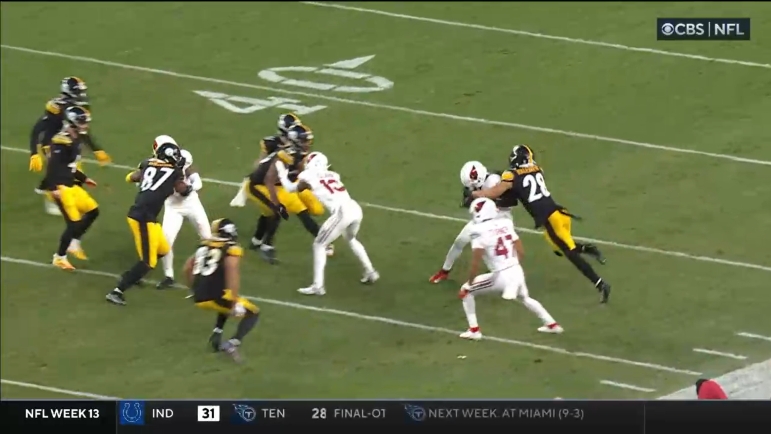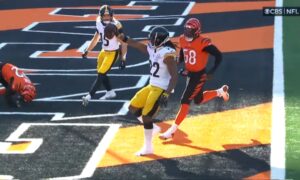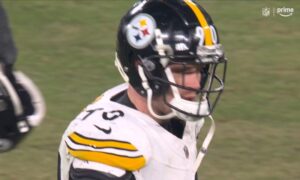The Pittsburgh Steelers have a problem, and it isn’t one that gets a lot of attention. That problem is special teams. Specifically, the rate at which the special teams unit commits penalties. This problem isn’t isolated to the 2023 season, either. Dating back to 2020, the Steelers have committed 70 penalties on special teams, the most in the league over that span, per data from nflpenalties.com. For reference, the Indianapolis Colts are the least-penalized special teams unit in the league and have had 28 penalties since 2020. This only counts accepted penalties, so the actual number of penalties committed is even higher.
The Steelers have not led the league in any single year, but have consistently been a top-five offending unit. Every year since 2020, the Steelers’ special teams group has committed 19 penalties. They have 13 this season which is tied for the fourth-most and puts them on pace to reach 19, the same they’ve had each of the last three seasons.
| Special Teams Penalties Since 2020 | |||
| Team | ST Penalty Count | ST Penalty Yds | ST Pre-Snap Penalties |
| Pittsburgh | 70 | 605 | 25 |
| Carolina | 68 | 517 | 28 |
| Dallas | 66 | 530 | 22 |
| Kansas City | 58 | 460 | 15 |
| Las Vegas | 56 | 456 | 22 |
| Houston | 56 | 401 | 25 |
| Tennessee | 55 | 467 | 13 |
| New England | 55 | 429 | 17 |
| Seattle | 53 | 425 | 21 |
| N.Y. Jets | 53 | 497 | 14 |
| Green Bay | 53 | 451 | 14 |
| Cleveland | 53 | 420 | 22 |
| Atlanta | 53 | 423 | 23 |
| Washington | 51 | 393 | 15 |
| Arizona | 51 | 425 | 15 |
| N.Y. Giants | 50 | 435 | 8 |
| New Orleans | 47 | 397 | 14 |
| Jacksonville | 47 | 374 | 16 |
| Minnesota | 46 | 342 | 17 |
| Detroit | 46 | 346 | 23 |
| LA Chargers | 45 | 332 | 21 |
| Buffalo | 45 | 368 | 8 |
| LA Rams | 44 | 364 | 8 |
| Denver | 44 | 335 | 9 |
| Baltimore | 42 | 344 | 15 |
| Miami | 41 | 317 | 16 |
| Chicago | 41 | 364 | 13 |
| Tampa Bay | 39 | 312 | 13 |
| Cincinnati | 39 | 295 | 9 |
| Philadelphia | 37 | 340 | 7 |
| San Francisco | 36 | 335 | 9 |
| Indianapolis | 28 | 238 | 7 |
Pittsburgh’s general philosophy and the way that they have tried to win most games since 2020 is counting on the defense to do most of the heavy lifting. The offense has been ultra-conservative and has protected the ball well. In theory, this can be a viable approach under two conditions—the defense holds up its end of the bargain, and special teams don’t consistently give opposing offenses a good starting field position.
The Steelers’ defense has been good, particularly at limiting points, but the special teams unit has let them down. What is the practical difference between an interception at midfield or a punt return that gets 15 yards tacked on due to a special teams penalty? In terms of field position, not a whole lot. This is one fatal flaw in the Steelers’ philosophy on how they like to win games. The defense is more of a bend-but-don’t-break unit. They have been good at limiting points, but not so much on yardage. If they are consistently being asked to defend short fields, they eventually will concede points.
Against the Cardinals, for example, Miles Killebrew was called for fair catch interference, face masking on punt coverage, and running into the kicker. Running into the kicker didn’t end up mattering because it isn’t an automatic first down, and the yardage wasn’t enough to convert, so it was declined. It just as easily could have given a fresh set of downs in other situations. The face mask penalty was a punt that was already returned to the Steelers’ end of the field and the 15-yard penalty set up a drive starting from the Steelers’ 33-yard line. The Cardinals scored on that drive. The fair catch interference was another 15-yard penalty. That drive would have started from the Cardinals’ 19, but instead started at the 34.
A good special teams unit can pair well with a good defense to consistently win the field position battle to both limit the opponent’s scoring opportunities and set up opportunities of their own. The Steelers’ unit has not done that well enough. Pair the penalty issues with the inconsistent punting, and the Steelers have a big problem on their hands.








